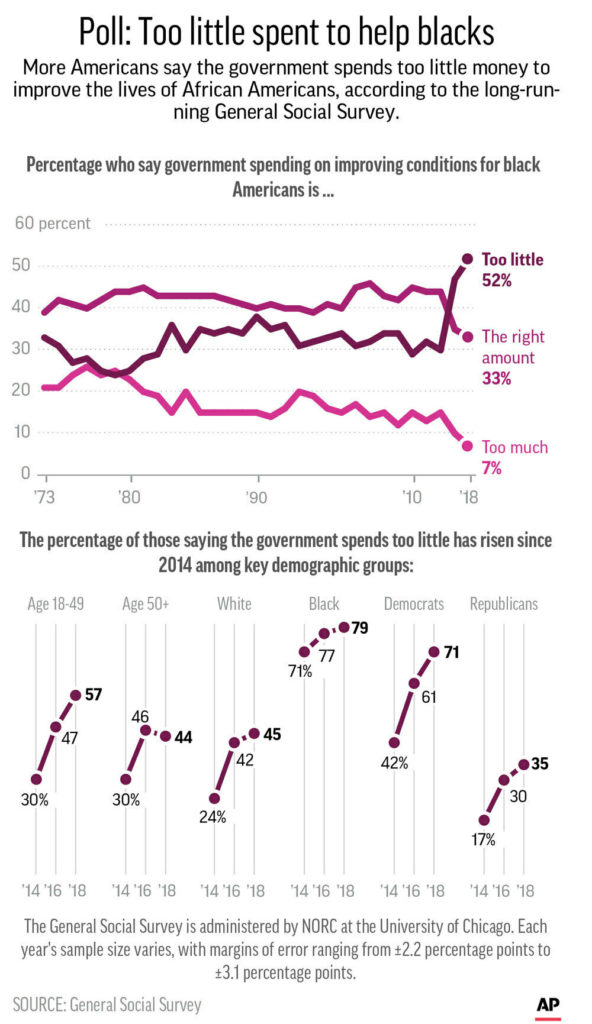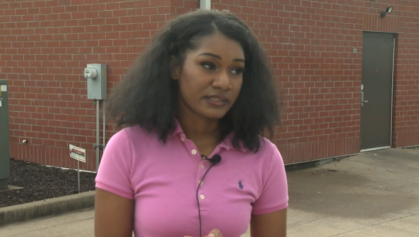WASHINGTON (AP) — A record percentage of Americans — including growing percentages of whites, blacks, independents, Democrats and Republicans — say they believe the U.S. government doesn’t spend enough on improving the condition of African-Americans, a U.S. survey shows.
According to the General Social Survey, a trends poll that has measured attitudes about race in America since the 1970s, 52 percent of Americans say the country spends too little on improving the conditions of blacks, up from 30 percent who said so in 2014. Just 7 percent — an all-time low — say the country spends too much.

Graphic shows results of GSS poll on government assistance for black Americans;
A growing percentage of Americans now attribute black-white inequality to discrimination and a lack of educational access rather than lack of willpower or motivation, the survey found, and about 3 in 10 Americans think the government is obligated to make up for past racial discrimination.
The Associated Press-NORC Center for Public Affairs Research and the General Social Survey staff analyzed the poll and found that attitudes against the government doing “special favors” for black Americans have dropped to the lowest levels since the survey began.
The shift in attitudes crosses racial and political lines, the poll showed, especially among white Democrats. The share of whites who say the country should spend more increased dramatically since 2014, by about 30 percentage points among Democrats and about 20 points among Republicans. The poll found that 79 percent of blacks, compared to 45 percent of whites, say the country spends too little on improving conditions for African-Americans.
Todd Shaw, a political science and African-American studies professor at the University of South Carolina, said white liberals and moderates are reevaluating their opinions about race relations.
The survey was conducted during a time of racial turmoil in the United States: The rise of the Black Lives Matter movement fueled by highly publicized police killings of black people; the election of President Donald Trump, who has been accused of racism; the deadly violence in Charlottesville, Virginia, during a protest against a Confederate statue.
The last few years have “likely given white liberals and moderates the sense that the country is heading in the wrong direction,” Shaw said.
The GSS and other polls show “there is a general sentiment that race relations have gotten worse under President Trump,” Shaw said. “Of course, it’s most reflective in the sentiments of blacks and other minorities, but you can see it in whites who self-identify as liberal or moderates. It’s even true among white Republicans, or to some degree white conservatives as well. There may be differing reasons for it, but the sentiment is there.”
While Democrats were most likely to say the country spends too little to improve conditions for blacks, the share increased to a record high for Republicans, Democrats and independents since 2014. Still, fewer than half of independents and Republicans agree with the sentiment.
The 2018 survey showed a widening age gap on whether the government is spending enough to help African-Americans, with almost 6 in 10 of those under 50 saying the government is spending too little and less than half of those age 50 and over agreeing with them. Support for more spending has increased across both age groups since 2014, leveling off among older Americans after 2016 while rising among younger Americans.
Other findings from the survey include:
— The percentage of Americans who say inequalities between blacks and whites result from discrimination increased from 33 percent in 2014 to 45 percent in 2018, and the percentage saying the differences are rooted in lack of access to education increased from 42 percent to 50 percent. Meanwhile, 36 percent of Americans now say inequality results from lack of motivation or will among blacks, down from 45 percent in 2014.
— Support for affirmative action remains low, with just 23 percent backing preferential hiring and promotion. This however showed an increase from the 18 percent in 2014.
— The percentage of Americans saying blacks should work their way up without special favors decreased from 68 percent in 2014 to 57 percent in 2018. While still a majority, the 2018 number is a record low in the survey.
The General Social Survey has been conducted since 1972 by NORC at the University of Chicago, primarily using in-person interviewing.
Sample sizes for each year’s survey vary from about 1,500 to about 3,000 adults, with margins of error falling between plus or minus 2.2 percentage points and plus or minus 3.1 percentage points.
The most recent survey was conducted April 12 through Nov. 10, 2018, and includes interviews with 2,348 American adults. Results for the full sample have a margin of error of plus or minus 3.1 percentage points.


